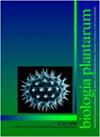磷酸盐饥饿增强水稻黄单胞菌pv。水稻的抗稻瘟病性
IF 0.9
4区 生物学
Q4 PLANT SCIENCES
引用次数: 0
摘要
细菌性叶枯病(BLB)是影响水稻发育和产量的常见病害。在制定合理的施肥策略时,考虑了主要养分,特别是氮对水稻褐枯草病易感性的影响。然而,缺乏磷(Pi)条件下水稻对BLB的防御机制尚不清楚。茉莉酸(Jasmonic acid, JA)是水稻为应对非生物和生物胁迫而产生的一种植物激素。本研究中,JA途径参与水稻对水稻黄单胞菌的反应。在两个对照水稻品种G299和G22中研究了低湿度条件下的米曲菌(Xoo)。测定了JA处理下JA相关基因和JA处理下Pi相关基因的表达情况。研究了G299和G22对Xoo感染的抗性。在ja敏感和pi敏感的cv中。G299、JA相关基因在低Pi处理下高表达,低Pi响应基因在JA处理下强烈上调。在耐JA和低耐Pi变异株中,JA和Pi通路均未被激活。含。低π值显著增强了水稻对Xoo的抗性。G299。我们的研究表明,缺磷使水稻对Xoo产生抗性。JA通路调节对低Pi的反应,这取决于品种。Pi响应基因参与了Pi胁迫,并可能参与各种非生物胁迫下植物整体生长的调控。这些发现为进一步了解磷酸盐缺乏与JA途径的相互作用及其对植物抗病性的影响提供了新的见解。本文章由计算机程序翻译,如有差异,请以英文原文为准。
Phosphate starvation enhances Xanthomonas oryzae pv. oryzae resistance in rice
Bacterial leaf blight (BLB) is a common disease that affects rice development and yield. The effects of major nutrients, especially nitrogen, on rice BLB susceptibility have been considered when devising rational fertilization strategies. However, the defense mechanism of rice against BLB under phosphate (Pi)-deficient conditions remains uncertain. Jasmonic acid (JA) is a phytohormone produced by rice plants to respond to abiotic and biotic stresses. Here, the involvement of the JA pathway in rice response to Xanthomonas oryzae pv. oryzae (Xoo) under low Pi was investigated in two contrasting rice cultivars G299 and G22. Expressions of JA-related genes under low Pi and Pi-related genes under JA treatment were assessed. The resistant capacity of G299 and G22 against Xoo infection was also investigated. In the JA-sensitive and Pi-sensitive cv. G299, JA-related genes were highly expressed under low Pi, and low Pi-responsive genes were strongly upregulated under JA treatment. Neither JA nor Pi pathways were activated in the JA-tolerant and low Pi-tolerant cv. G22. Low Pi strongly enhanced rice resistance to Xoo in cv. G299. Our study demonstrated that Pi deficiency confers rice resistance to Xoo. The JA pathway modulates the response to low Pi, depending on the cultivar. Pi-response genes are involved in Pi stress and may participate in the regulation of overall plant growth under various abiotic stresses. These findings provide new insights into the interaction between phosphate deficiency and the JA pathway and the subsequent effect on plant disease resistance.
求助全文
通过发布文献求助,成功后即可免费获取论文全文。
去求助
来源期刊

Biologia Plantarum
生物-植物科学
CiteScore
2.80
自引率
0.00%
发文量
28
审稿时长
3.3 months
期刊介绍:
BIOLOGIA PLANTARUM is an international journal for experimental botany. It publishes original scientific papers and brief communications, reviews on specialized topics, and book reviews in plant physiology, plant biochemistry and biophysics, physiological anatomy, ecophysiology, genetics, molecular biology, cell biology, evolution, and pathophysiology. All papers should contribute substantially to the current level of plant science and combine originality with a potential general interest. The journal focuses on model and crop plants, as well as on under-investigated species.
 求助内容:
求助内容: 应助结果提醒方式:
应助结果提醒方式:


